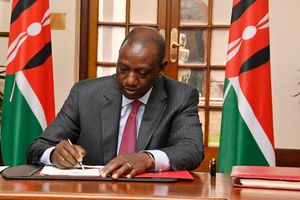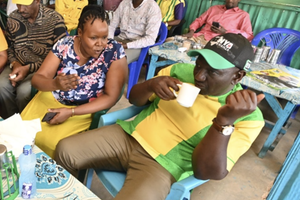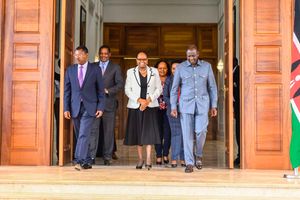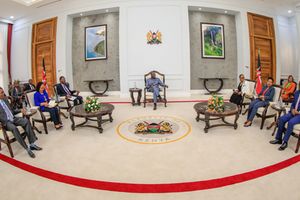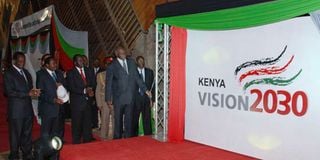
Then-President Mwai Kibaki (right) with then-Prime Minister Raila Odinga (third left), then-Vice-President Kalonzo Musyoka (second left) and then-Planning Minister Wycliffe Oparanya when they unveiled the Vision 2030 logo at KICC, Nairobi, in 2008.
Here was one positive way to think about Vision 2030 during the Grand Coalition government that promoted it: even if we are quarrelling, get on the bus. It is heading to Vision 2030.
If we must quarrel, let’s do it while on the bus! You can call me names as we head to a democratic, middle income, industrializing country, with a high quality of life. Political competition was to be about getting there in the fastest way possible.
Vision 2030 was and is our common vision. Our national interest, one general called it. And it is more than the health of the nation’s economy. It is aspirational about how we want to live and the kind of nation we want.
One aspect of it is the involvement of government in the commercial sector. Most agree that government should be a facilitator not participant in commerce. We have struggled with it many times. Public Enterprises Performance was reviewed 1979, in 1982, and a decade later in 1992.
The 1992 review - Policy Paper on Public Enterprise Reform and Privatization - classified 240 commercial enterprises with public sector equity participation into 207 non-strategic and 33 strategic. All the non-strategic were to be privatized. Recent media reports that government “kicks off” privatization tell only half the story. We have been on this road before. I recall Kabarnet Hotel on sale in 2001, a whole 23 years ago. At that time a fire had gutted one wing. Perhaps the reason it never got takers. A story, no doubt, for another day.
One enduring lesson from the Grand Coalition Government was that we do not have to derail the Vision 2030 in the name of political competition. Any vision, any strategy, will however, face risks.
But some of the risks are self-inflicted. Decades of negative politics have coloured our eyes, instilling fear and suspicion among us, to a point of abandoning the bus. Populists regularly exploit these fears to gain power. All this undermines our democracy, our ability to create and sustain industry.
My colleagues and I spent this past week on assignment in Migori County. A couple of friends from Mt Kenya calling to catch up readily admitted they don’t know where Migori is. One told me they have ventured to Kisumu and no further. It occurred to me that the amazing beauty and bounty of the lake region is forever lost to them. The spirit of the Vison is lost to them. Both are quite well travelled overseas. Both trade across borders regularly. Yet they have not found opportunity to check out other regions in our republic.
But as I reflected on my friends, it reminded me of myself. I had travelled, studied, worked and holidayed on three continents before I had visited many parts of Kenya, away from the narrow confines of my neighborhood of Laikipia and Nyeri. As with other lads my age, I had gone to Nairobi courtesy of relatives, and on my way to school. The one trip to Kabarnet was rehashed in stories for a decade.
That was then. But what about now? Why is it that a person from Nyeri will know Nairobi, Mombasa and Johannesburg, but not Kisumu, Homabay or Migori?
Clearly decades of negative politics, promoting negative ethnicity, has left many of us seeing each other through the lens of political insults. That lens blinds us from the great benefits of our comity.
Falsely believing politics to be a dirty game, we have accepted low quality politics. We applaud as politicians spread hate and bigotry. We think it okay to denigrate one another. In so doing, we preclude for ourselves the opportunities of working together, of trading with each other and building a nation together. Bure kabisa.
My colleagues and I had great experiences in Migori. We went to the market to speak with traders about cashless payments. They want to go cashless, to ensure, they told us, that the money gets to where it is intended. They worry, however, what they will do because of fuliza. We are all on fuliza, it soon emerged. Courtesy of the KK regime. We all laughed to mask the pain.
It may not be obvious, but technology is a reflection of us. As I start writing this column, the predictive text writes King’ori when I type Migori. It would seem even AI is not neutral and bias free.
Staying home gives us a false certainty. Too many have not ventured beyond the neighboring county. I have found working in other counties great. The fear of other communities has its roots in negative politics. Unfortunate, because as I travel and work in different parts of the republic, I find the people are kind, generous, amazing and welcoming.
We recently visited Jaramogi Oginga Odinga Teaching and Referral Hospital commonly referred as Russia hospital, the scene of the infamous confrontation between Jomo and Jaramogi. I could not help but think about that incident as the beginning of five decades of caricaturing and dehumanizing each other.
While in Migori, we went to Kehancha and Isebania. We passed through Awendo and Rongo. We stayed in Migori town. We were saddened to learn that the national government continues blatant efforts to claw back county functions such as pre-primary education.
As we drove through many towns, stopping for meetings in some of them, I was impressed by the spirit of commerce. Retail trade is vibrant. Grade A buildings in many of them. Transportation services are prolific. The service is predominated by the boda boda. Most markets are vibrant.
We were pleased to learn that Migori Revenue Authority has an excellent Ushuru Center, previously called the automation house, where issues of county taxes and fees are resolved. The centre is located within Migori town and serves county revenues payers with diverse needs and requirements. All in the efforts by the county to mobilize the much-required own resource revenue for development.
@NdirituMuriithi is an economist

